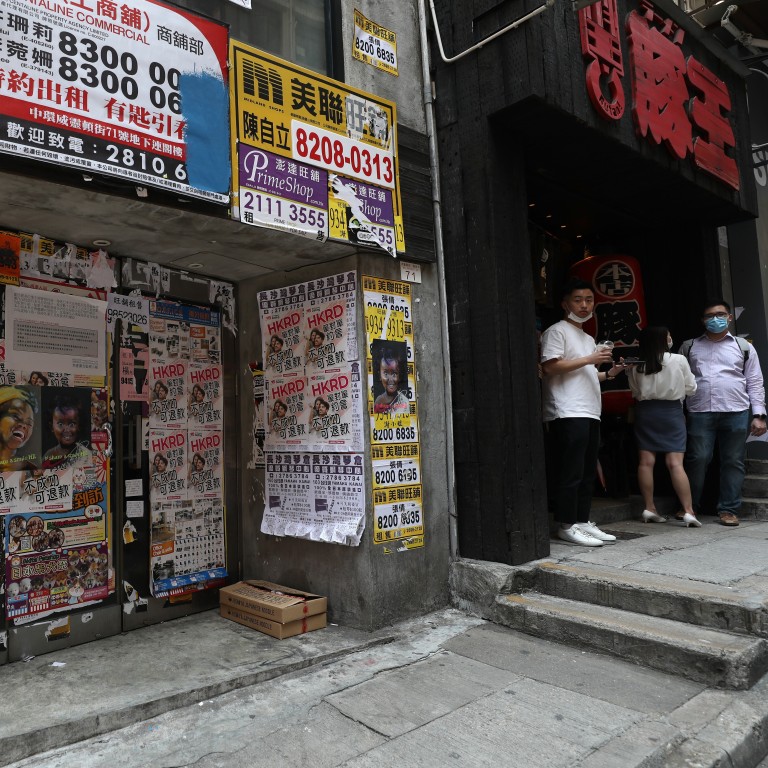
Hong Kong SMEs expect little relief from government’s HK$1 trillion Covid-19 funding support
- Starting Monday, the Hong Kong government will guarantee 100 per cent of loans of up to HK$4 million made to SMEs
- Personal guarantees by company directors, eligibility could limit impact
Four in every 10 small and medium enterprises (SMEs), which employ about 45 per cent of non-government employees in Hong Kong, expect their earnings to plunge by 75 per cent over the next year, according to a survey.
A poll conducted by Phil Aldridge, who chairs the SME and Start-up Committee for the British Chamber of Commerce in Hong Kong, this month found that about 40 per cent of the 350 companies covered expected their revenue to fall by 75 per cent or more because of the Covid-19 outbreak. More than 60 per cent said they were very dissatisfied by the government support measures. When asked what they wanted from the government most of all, more than 40 per cent said they wanted a grant scheme rather than a loan scheme.
It, therefore, does not come as a surprise that the sector was uncertain about relief from the HK$1 trillion (US$129 billion) of lending support offered by the city’s government to battle the coronavirus outbreak’s economic fallout.
Starting Monday, the Hong Kong government will guarantee 100 per cent of loans of up to HK$4 million made to SMEs at low interest rates. The loans will, however, require company directors to add a personal guarantee. Banks will not face any risks.
Peter Shiu Ka-fai, the Hong Kong Legco member representing wholesale and retail, however, said the new scheme was much needed. He said banks were reluctant to lend to SMEs on previous occasions, when the government guaranteed 80 per cent to 90 per cent of loans, as these left them with some risk. However, bad debt on government-backed loans for SMEs during the Sars epidemic in 2003 amounted to just 4 per cent. “This showed most SMEs did not abuse the scheme,” he added.
Personal guarantees could prove to be a sticking point. Aldridge, who is also the chief operating officer at IT services firm Function Eight, said such a requirement will create uncertainty among SME executives about what will happen if their company fails, and whether they will be able to restart their business, or get credit of any kind.
Moreover, the government’s relief measures have other gaps – the 100 per cent guarantee applies only to new loan applications. A Hong Kong-based coffee trader speaking on condition of anonymity said they had not been able to get any funding from the government, as their company was not in the retail or food and beverage sectors. Their main problem was an existing loan from HSBC, the city’s biggest lender.
The company had reported a 90 per cent year-on-year drop in sales in the first three months of 2020, but the bank had refused to help. “We don’t want another loan. We want the bank to assist by giving us an extension on our current loan, so that we can breathe a little easier.”
Hong Kong unveils Covid-19 relief package worth HK$138 billion
Some potential applicants were worried about a lengthy process. “I want more flexible features under the scheme,” said Ivan Wong, who owns Yakiniku More, a restaurant in Tsim Sha Tsui. He ultimately dropped the idea of borrowing under the new loan scheme. “The lengthy application process, which may need several weeks or even months, was also a concern,” he added.
The Hong Kong Mortgage Corporation (HKMC), the government agency offering the SME loans through commercial banks, however, dismissed this concern. “We believe lenders will approve applications speedily,” a spokeswoman said. This was because the government was fully guaranteeing the loans, and all the lenders had to do was focus on eligibility rather than a company’s ability to repay the loan.
Since February, banks have approved 9,000 applications for loans as well as other relief measures worth HK$57 billion to help companies cope with the coronavirus outbreak, according to the Hong Kong Monetary Authority. When the authority, Hong Kong’s de facto central bank, lowered the regulatory requirements on funding for banks, it was made clear to lenders they must use the capital to support the economy, particularly the SME sector, the HKMC spokeswoman added.
Aldridge said his poll was conducted before the introduction of the HK$80 billion Employment Subsidy Scheme (ESS), which he said would certainly improve sentiment. The ESS is a newly announced plan that will help employers by covering half of their staff members’ salaries up to HK$9,000 per month each for six months.
He did see some hope for the future, he added. “The Commercial and Economic Development Bureau has been very receptive, they do seem to listen. Not every government has got it right the first time around,” he said.


